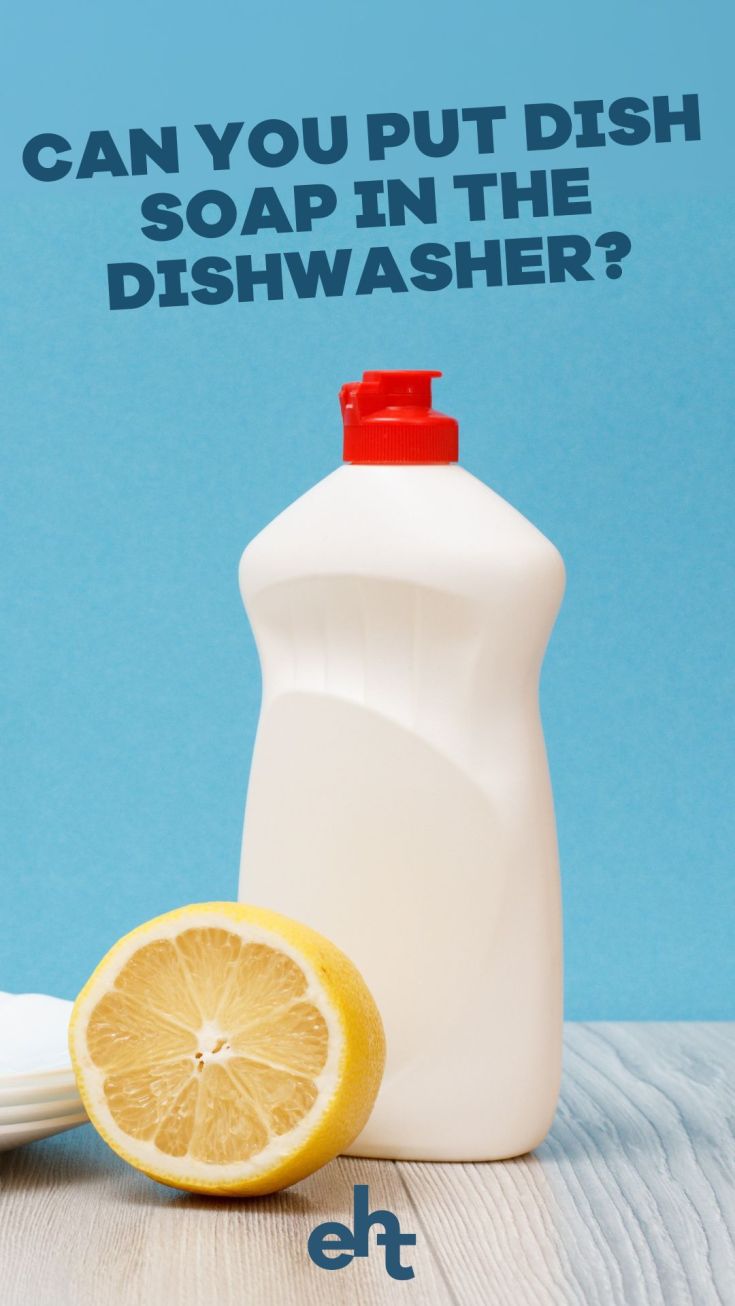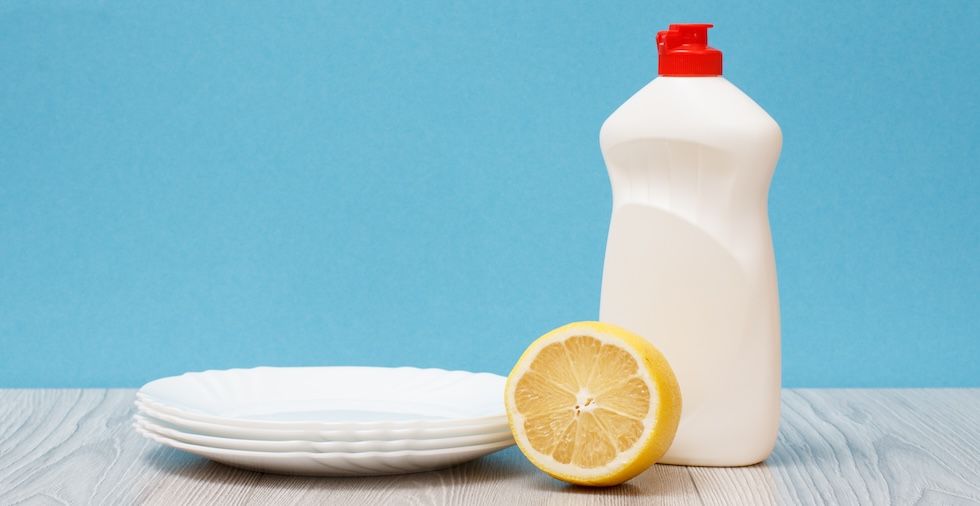- Can you put dish soap in a dishwasher?
- Dishwasher-safe alternatives to dish soap
- How to clean your dishwasher (if you've used dish soap)
- How to deep clean your dishwasher after using dish soap
You've finished hosting a dinner party (or maybe cooking for the whole family) and you're left with a bunch of dirty plates, pots, and pans. It's times like these when you're truly grateful for having a dishwasher. You load it up and you're ready to go. There's just one problem.
You're completely out of dishwasher tablets.
In a moment of panic, you reach for some dish soap and squirt it directly into the compartment. You think it's an easy fix. Logic tells you it should work. However, before you know it, you've got a big, bubbly, soapy mess on your hands. Yikes.
Luckily, you've come to the right place. In the following guide, we'll explain exactly why using dish soap is a bad idea, what alternatives exist, and how to clean up the mess if it's too late.
Can you put dish soap in a dishwasher?
The short answer to this question is no. And it all comes down to the bubbles.
Regular dish soap and washing-up liquid (for example, supermarket brands, Fairy, and the like) are designed to create a lot of foam. That's what makes them so effective when you're hand-washing things in the sink. However, it can create a messy situation in your dishwasher.
If you've ever made this simple mistake, you know the drill. Here's what can happen:
- Your dishwasher overflows into your kitchen
- It damages the dishwasher's drainage and rinse cycles
- You end up with bubbles all over the place
- It leaves a sticky residue on dishes
- You may need to deep clean your dishwasher
Not only that, but using dish soap in your dishwasher can hinder the inner workings of the machine; in the long term, that could shorten the lifespan of the product. Put simply, it's not a smart idea, and you should avoid it at all costs.
Don't panic if you've already done it. (We've all been there!) Skip the following section and move on to our easy clean-up guide below.
Dishwasher-safe alternatives to dish soap
Okay, now you know not to use dish soap or washing-up liquid in your dishwasher. Good. But what should you use instead? If you can't pop out to the shop to get more tablets, there are some home remedies you might want to try out. Let's break them down:
1. Baking soda and salt
Mix a tablespoon of baking soda with a tablespoon of fine salt. Add this to the compartment and run the dishwasher on a regular cycle.
Baking soda has excellent antibacterial properties and serves as a versatile, makeshift cleaning product. Sure, it won't do as well as a commercial detergent, but it's better than using nothing. If you find yourself in a pickle, it's worth giving this DIY cleaning combination a literal whirl.
2. White vinegar and baking soda
Out of salt? As a one-time emergency cleaner, you can use a bowl of white vinegar (placed on the top rack) and a tablespoon of baking soda in the bottom of the dishwasher.
Run a short, hot cycle. This nifty combination helps break down grease and neutralise nasty smells without causing foam overload.
Be careful! You should avoid using this method frequently, as excessive vinegar can damage rubber seals over time. The last thing you want is to do more damage.
3. Dishwasher powder
Got any powdered dishwasher detergent in the cupboard? Check the back and see. This is an excellent alternative to pods. If you haven't used it in a while, ensure that you measure it out accurately. Follow the instructions on the back of the packet, if in doubt.
How to clean your dishwasher (if you've used dish soap)
Let's say you came to our guide too late and have already witnessed the bubbling disaster at play. It happens. Most people make this mistake at some point, so you're not alone.
However, it's essential to clean up before doing anything else. Check out our step-by-step guide below to help you along the way.
What you'll need:
- Old towels (or tea towels)
- Vinegar
- One measuring cup
- A sponge or a cloth
- Mop
Step 1: Stop the cycle
If possible, cancel the wash cycle and open the door. If it's still going, press stop and open the door slowly. Be prepared for foam to spill out.
Of course, some dishwashers won't stop midway through. If that's the case, you might need to wait for it to finish. Switching it off at the mains is a mistake, as it won't drain before you open it.
Step 2: Mop up excess suds
Use a mop and towels to clean up the foam from the dishwasher and the floor. Chances are, a lot of bubbles will spill out when you open the door. Deal with these ASAP.
Step 3: Take out your dishes
Spoiler: Your dishes will be soapy. Remove all of them and rinse them thoroughly. If you don't do this quickly, you will find that they dry with a sticky coating on them.
Step 4: Add some vinegar
Add some white vinegar to the bottom of the dishwasher. This should help to neutralise the soap suds. Add approximately 250 ml to the appliance.
Step 5: Rinse (and repeat!)
Next, you'll need to run a rinse-only cycle. When you've done that, check the inside of the dishwasher. If you can still see loads of soapy suds, repeat this step.
Step 6: Wipe
Finally, you'll want to wipe down the inside of the machine. To do this, use a clean sponge or cloth from your kitchen. The idea is to remove any lingering residue.
How to deep clean your dishwasher after using dish soap
You've already done the immediate clean-up. However, if you're concerned about any lasting damage, it may be worth doing a thorough clean. Here are the steps you can take:
Step 1: Rinse the filter
Remove the filter from your dishwasher and rinse it thoroughly under warm water. You can also use a soft brush to scrub away soap scum and food debris.
Step 2: Clean the arms
Did you know you can clean the spray arms of your dishwasher? If they are removable, take them out and flush out any clogs or residue by running water through them.
Step 3: Wipe it all down
Get in there and wipe down the interior walls with a damp cloth and vinegar to remove any film. You may want to run a hot cycle with a dishwasher-safe cleaner to flush everything out/
Step 4: Air out your machine
Don't forget to let the dishwasher air out with the door open for a few hours. This will not only help it dry, but also eliminate any lingering soapy residue. Simple.
When you've done all of the above, your dishwasher should be returned to its former glory. From now on, promise yourself (and your machine!) that you won't use dish soap again.
No matter how tempting it may be, you should never put regular dish soap into your dishwasher. Many people think that this is a simple answer, but it's just not worth the risk. From flooding your kitchen with soap and water to damaging the appliance, there are too many downsides.
However, there are some alternatives you can use. In this guide, we've covered some of the options you might want to consider. While these will work in a pinch, it's always best to use dishwasher powder, pods, or tablets in your machine.
Q&A
Did we miss something along the way? Don't panic — we've answered some frequently asked questions below:
Can you use laundry detergent in a dishwasher?
No. Laundry detergent is not food-safe, so you should never use it in your dishwasher. It could coat the dishes and plates with harmful chemicals that, frankly, you don't want to ingest.
Is there any dish soap that is dishwasher-safe?
No, there isn't. Your everyday liquid dish soap is not suitable for use in dishwashers. Instead, look for products labelled as "dishwasher detergent." These will be fine to use in your machine and won't create loads of bubbles.
Can I run a dishwasher without detergent?
You can… in emergencies. Ensure you rinse all your pots, pans, and dishes before using this approach. Unsurprisingly, this will not clean as well as usual, and you shouldn't make a habit of doing it.
Can baking soda damage the dishwasher?
Baking soda is safe to use in your dishwasher and will not damage it. If you're looking for a natural alternative to commercial products, you can try using this one.
Did we answer your question? Let us know in the comments below!


Leave a Reply